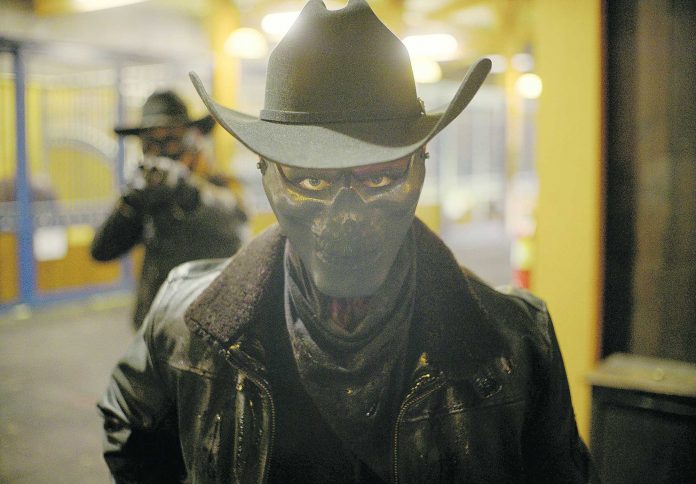
By MARK KENNEDY
AP Entertainment Writer
The dystopian action-horror “Purge” franchise has previously made stops in New York City, Los Angeles and Washington, DC. Now it’s time to pull on cowboy boots and get ready for a little twangy Purge.
“The Forever Purge” is set along the U.S.-Mexican border and it’s perhaps the most overtly political of the series, portraying a ragtag group of Americans trying to flee the anarchy and white supremacy of Texas for the safety of Mexico as the annual U.S. bloodlust event turns into an everyday abomination.
The film jettisons its horror roots for an aggressive — some may call it ham-fisted — social critique of modern America. But watching video of real insurrectionists on Jan. 6 try to violently take over the U.S. Capitol makes portions of “The Forever Purge” seem like a documentary.
“We are the real patriots of America,” announce a group of the mask-wearing white supremacists during the latest fictional bloodletting, hoping to exterminate anyone Black or brown. “America will be America once again.” There’s no escaping the feeling that “The Forever Purge” is a poison pen letter to Trumpism.
For those just joining creator James DeMonaco’s “Purge” series, here’s how it works: In a near-future, the government, led by a nefarious party called the New Founding Fathers of America, allows an annual 12-hour period of lawlessness without recriminations.
Over the course of a single night, rape, murder, robbery and everything else is permitted across the nation as a way to release anger but also a way to cull from an overpopulated nation and lower crime.
The last chronological film in the series — 2016’s “The Purge: Election Year” — seemed to end with an outlawing of the purge, but that clearly didn’t last. The New Founding Fathers are back in charge as “The Forever Purge” opens and their annual horror shows have been reinstalled. There’s also a wall established along the southern border.
“It’s starting, y’all,” one main character in a Texas town announces as the purge countdown begins. She is protected by wealth in her ranching compound but her immigrant employees must huddle for safety in a makeshift shelter.
This time, the annual purge time passes without anyone we care about ending up dead, but then the event doesn’t end. The film cracks open at this point, adding class resentment to the mix. Groups of poor disenfranchised whites across the country begin targeting their white bosses and vowing that the purge won’t stop. “Ever After!” is their war cry.
That makes strange allies of the Tucker ranching family and a pair of newly arrived immigrants from Mexico: Adela (Ana de la Reguera) and her husband Juan (Tenoch Huerta).
Up until then, the Tucker’s son, Dylan, (Josh Lucas) was flirting with outright white supremacy, not wanting Spanish to be heard in his house and not believing that cowboys could be anything but white Americans. Now, he and his family are being kept alive by the very people he disdained.
Martial law is declared but the Army can’t stop the lawlessness. A potential escape may come from America’s neighbors: Canada and Mexico, who have opened their borders for six hours to any refugees from the madness.
The film under Everardo Gout’s direction then becomes a quest as the Tuckers — including Dylan Tucker’s pregnant wife — together with Adela and Juan fight their way to El Paso, hunted by masked men demanding purification of the white race.
DeMonaco is not at all subtle with his script and maybe that’s for the best. In one scene, a crazed white supremacist with a swastika face tattoo listens to various gunfire cracking outside, identifying each weapon by its blast — AK-47, Glock, AR-15. He calls it a very American sound: “Homegrown music from the American heartland.”
Over the past films, DeMonaco has explored all kinds of different facets to this rich and complex purge notion, from gun control to the behavior of predatory corporations, to government brutality against people of color and class wars. They have hardly felt like sci-fi when neo-Nazis really have marched openly in U.S. streets.
Here DeMonaco finds richness in flipping the script on traditional right-wing notions of the border and immigration. In the film, it is people of color who are kind, resourceful and brave, saving a well-off white family from white horrors, with one refugee hoping to give birth in a place better than America — the reverse of the so-called traditional anchor baby notion.
They are all led to safety to Mexico — and this is a genius move by DeMonaco — by a Native American guide and fighter. “This is not your fight,” he is told. But he responds: “We’ve been fighting this fight for 500 years.” Happy Independence Day, y’all!
















